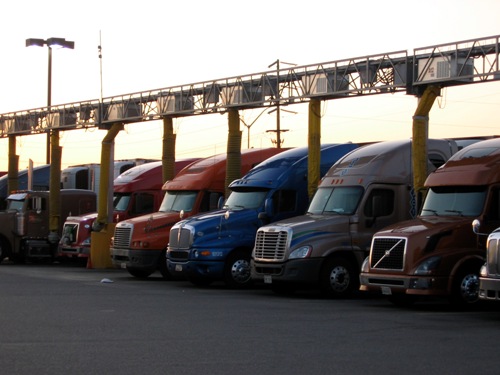Friday on The California Report’s weekly magazine, Rori Gallagher reports on ways to assuage your carbon guilt with a quick stop at an airport kiosk.
By Rori Gallagher

I first got the idea to do a story on carbon offsets back in December, when San Francisco International Airport announced it was partnering with a private company called 3Degrees to install carbon offset kiosks.
Originally, the kiosks were supposed to be installed sometime “in the spring.” But there seems to be a delay with the contract negotiations. I kept checking in with 3Degrees about a launch date. At first they were saying Earth Day–then it was pushed to May, and now “by the end of June.”
But there are already other options out there. I found that Virgin America, the only major airline based in California, was the first to offer carbon offsets in the sky. Other airlines do offer customers the chance to purchase offsets but Virgin allows you to do it during the flight through the in-flight entertainment system.
Carbon offsets are supposed to stop carbon emissions that would have otherwise taken place. That’s really difficult to substantiate. Projects like wind farms for example, certainly seem good for the environment but likely most of them would be built anyway and produce power without this type of third-party incentive.
Virgin’s program managers say they stringently vetted carbon offset programs, and that theirs are among the most credible out there. But as I point out in my radio story, there is very little regulation of the voluntary carbon offset industry and it’s difficult to know if they’ll do what they say they will.
There are some independent efforts to separate the sheep from the goats, for example the Natural Resources Defense Council has produced a buyer’s guide for carbon offsets.

2 thoughts on “Carbon Offsets in the Air”
Comments are closed.

Carbon offsets are a gross misnomer. They offset nothing, removing zero pollution from the environment. Mostly, they subsidize the capital and operating costs of devices and projects that generate low-pollution power somewhere far away from where you live, and that aren’t viable on their own in a market economy. For example, the dairy farms in california get tradeable credits for buying and operating expensive methane-digesters to process their animal dung. Those tradeable credits subsidize the cost of the machines. Why should I subsidize the operations of dairies, a for-profit operation? If the social goal is worthwhile, let the national government subsidize the efforts, since state governments are broke. Let the device manufacturers bring their costs down, or let the dairies raise their prices even more.
When the sellers of credits can point to local non-profit projects that my purchases subsidize, and they call these financial instruments what they are – pollution emission subsidies – then I’ll be interested in buying them. Until then, they’re only slightly better than the indulgences the the Catholic church used to sell.
My thoughts exactly jake3_14. I also am very skeptical of supporting carbon offsets from methane capture from livestock and landfill operations since they don’t do anything about preventing the production of excess carbon emissions in the first place. It would be much more proactive to decrease meat consumption and waste production instead and as a result, avoid investing in the complicated machinery to “capture” what would be largely avoidable emissions.
I’ve been looking for local non-profits to invest in as well, but so far haven’t found any…hmmm…